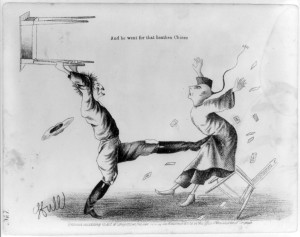 A post today in the Forbes blog by Monty Munford laments the millennial generation’s use of technology in planning travel. In the post, “Too Much Technology Is Making Travel Boring, Exhibitionist And Inauthentic,” Munford cites a recent study by Expedia, which he says shows that millennials do not have the “adventurous” attitude towards travel of earlier generations. His gripe is that before venturing abroad young people get information online the places they want to visist: “The shocking aspect I mentioned earlier about the report was the degree to which Millennials are using technology to check out the places they want to travel to before they leave.” He compares that experience to his own travels: “In my day you bought a Lonely Planet travel book, read it, remembered the places you’d read about and left the book at home. That was that. Onwards, empirical discovery and adventure. That was all the technology that was required.” He laments as well the fact that travelers post their experiences on social media, which, in fact, may be in part be a driver in deciding where to travel.
A post today in the Forbes blog by Monty Munford laments the millennial generation’s use of technology in planning travel. In the post, “Too Much Technology Is Making Travel Boring, Exhibitionist And Inauthentic,” Munford cites a recent study by Expedia, which he says shows that millennials do not have the “adventurous” attitude towards travel of earlier generations. His gripe is that before venturing abroad young people get information online the places they want to visist: “The shocking aspect I mentioned earlier about the report was the degree to which Millennials are using technology to check out the places they want to travel to before they leave.” He compares that experience to his own travels: “In my day you bought a Lonely Planet travel book, read it, remembered the places you’d read about and left the book at home. That was that. Onwards, empirical discovery and adventure. That was all the technology that was required.” He laments as well the fact that travelers post their experiences on social media, which, in fact, may be in part be a driver in deciding where to travel.
This point of view, I would imagine, would strike most people as very strange – who wouldn’t use the internet to check out in advance places one is hoping to visit, not just to find out about tourist sites, but to read travel journals, book hotels, even to make contact with folks at the sites abroad. Most people would be sure as well to find out what options there would be at the destination to stay connected. But having recently written a piece for Language Learning & Technology on “Integrating Technology into Study Abroad”, I’ve found that the view expressed by Munford can be frequently found in advice given to students going abroad:
It is not difficult to find numerous warnings for students going abroad about the downsides of remaining digitally connected, with articles such as “How the Internet screwed up study abroad” (Roberts, 2010) or “Benefits of study abroad WITHOUT technology” (Lee, 2015). National Public Radio in the US recently ran a story on how “Tech may get in the way of good culture shock while studying abroad” (Keck, 2015). In that report, a US student studying in Brazil described the epiphany she had when her phone (used for Internet connections) broke: “Without my phone I would just stay downstairs and talk with my [host] family. And it was like…it was great.” In a piece in the Chronicle of Higher Education, “How Facebook can ruin study abroad”, Robert Huesca (2013) recommends a media pledge for study abroad programs, similar to the pledge students often take to use the target language exclusively. In this case, the pledge would be not to use their digital music libraries, stream home television shows, or use instant messaging. Study abroad guidebooks frequently issue recommendations to students that they minimize their use of the Internet and mobile devices (Doerr, 2012). At least one study abroad provider, Carpe Diem Education, prohibits students from bringing cell phones on study abroad programs.
I argue in the article that this perspective is misguided – technology, used both in advance and during travel abroad – can considerably enrich the experience. But tech use is more likely to be effective, if thoughtful and guided, and oriented both to maintain contact back home and to establish relationships with the target culture:
The overreliance on home networks may indeed mitigate the value of the experience abroad as a means to gain a new perspective on one’s own cultural values and beliefs as well as those of people in the target culture. This makes orientation, guidance, and support before and during the program of great importance. The advice given needs to go beyond turning off cell phones, but should instead offer concrete tips on how both to maintain contacts back home and to engage with the host community electronically and in person.
Part of that preparation for going abroad should include at least some effort to learn both about the target culture and, if applicable, some elements at least of the language spoken.
